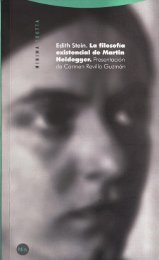The Collected Works of EDITH STEIN ON THE PROBLEM OF EMPATHY
You also want an ePaper? Increase the reach of your titles
YUMPU automatically turns print PDFs into web optimized ePapers that Google loves.
Edith Stein<br />
the speaker is not comprehended in the u'ords. Rather, he is<br />
prehended at the same time as they. Nor does this at first play<br />
ry role in the words' meaning, but only when it points toward<br />
eir intuitive fulfillment. For example, in order to fulfill the<br />
eaning <strong>of</strong> a perceptual statement, I must put myself into the<br />
ker's orientation. 'Ihus the words can be considered entirely<br />
rhemselves without regarding the speaker and all that is going<br />
in him.<br />
Now what distinguishes the word from the signal? On the one<br />
nd, rve have the signaling thing, the circumstances <strong>of</strong> the pro-<br />
, the bridge that convention has thron'n betn'een them and<br />
t is perceivable as this "ought to indicate." <strong>The</strong> circumstances<br />
mselves remain entirely undisturbed by the fact that the signal<br />
esignates them. On the other hand, there is first <strong>of</strong> all no verbal<br />
hysical body fWortkiirperf corresponding to the signaling physirl<br />
body lSignalhArperl, only a verbal living body fWortleibl. <strong>The</strong><br />
I expression could not exist by itself, and neither has it<br />
eived the function <strong>of</strong> a sign from the outside in addition to<br />
it is. Rather, it is ahvays the bearer <strong>of</strong> meaning in entirely the<br />
me manner n'hether the meaning is really there or whether it is<br />
vented. On the contrary, the signal is real. lf it is invented, its<br />
nction as a sign is merely invented, too, whereas there is no such<br />
ing as an invented meaning <strong>of</strong> u'ords. <strong>The</strong> living body and the<br />
I <strong>of</strong> a word form a living unity, but one permitting to both a<br />
latively independent development.l0T A signal cannot develop.<br />
nce it has received its designation it continues to convey it<br />
nchanged: and the function an act <strong>of</strong>choice has assigned to it, an<br />
t <strong>of</strong> choice can take au'ay again. Further, it only exists by reason<br />
f a creative act completed in it. But as soon as it exists it is<br />
vered and independent from this act like any product <strong>of</strong> human<br />
rtistry. lt can be destroyed and cease functioning u'ithout its<br />
creator" knou'ing anything about it. If a storm u'ashes au'ay all<br />
rail markers in the Riesengebirge, hikers will get lost. This can<br />
appen without the Riesengebirge Association, the creator <strong>of</strong> this<br />
1'stem <strong>of</strong> signs, being responsible for this, since it believes they<br />
re still in the best condition. This cannot happen rr.ith a word,<br />
or it is alrvavs borne by a consciousness (which is naturally not<br />
hat <strong>of</strong>'him *,h,, i. speaking here and nou,). It lives "by the grace"<br />
C onstitution <strong>of</strong> the P sycho-Physical Indiuidual<br />
<strong>of</strong> a spirit (i.e., not by reason <strong>of</strong> the spirit's creative act, but in<br />
living dependence on it). <strong>The</strong> n'ord's bearer can be an individual<br />
subject but also a group <strong>of</strong> possibly changing subjects bound into<br />
one by a continuity <strong>of</strong> experience. Finally, we have the main<br />
difference: Words point to the object through the medium <strong>of</strong><br />
meaning, while the signal has no meaning at all but only the<br />
function <strong>of</strong> being significant. And u'ords do not simply point to<br />
the circumstances as the signal does. What goes into them is not<br />
the circumstance, but its logico-categorical formation. Words do<br />
not signify, but express, and $'hat is expressed is no longer what it <br />
u'as before.l08<br />
Naturally, this also applies when something psychic is expressed.<br />
Should someone say to me that he is sad, I understand<br />
ihe meaning <strong>of</strong> the words. <strong>The</strong> sadness I now knolv <strong>of</strong> is not an<br />
"alive one" before me as a perceptual givenness. It is probably as<br />
little like the sadness comprehended in the symbol as the table <strong>of</strong><br />
u'hich I hear spoken is like the other side <strong>of</strong> the table which I see'<br />
ln one case I am in the apophantic sphere, the realm <strong>of</strong> propositions<br />
and meanings, in the other case in immediate intuitive contact<br />
with the objective sphere.<br />
Meaning is always a general one. In order to comprehend the<br />
object intinded right no'w, we always need a givenness <strong>of</strong> the<br />
intuitive basis <strong>of</strong> the meaning experiences. <strong>The</strong>re is no such intermediate<br />
level between the expressed experience and the expressing<br />
bodily change. But meaning and symbol have something in<br />
common which forces them both to be called "expression" repeatedly.<br />
This is the fact that together they constitute the unity <strong>of</strong><br />
an object, that the expression released from the connection $'ith<br />
r"hat ls expressed is no longer the same object (in contrast with<br />
the signaling physical body), that the expression proceeds out <strong>of</strong><br />
the experiencer0e and adapts itself to the expressed material.<br />
<strong>The</strong>se relationships are present in simple form in bodily expression;<br />
they are doubled in a certain sense in verbal expression:<br />
rvord, meaning, ob.ject; and, correlatively, having <strong>of</strong> the object,<br />
logical intention or meaning, and linguistic designation. <strong>The</strong><br />
function <strong>of</strong> expressing, through u'hich I comprehend the expressed<br />
experience as the expression, is always fulfilled in the<br />
experiencein which expression proceeds from what is expressed'<br />
8l

















